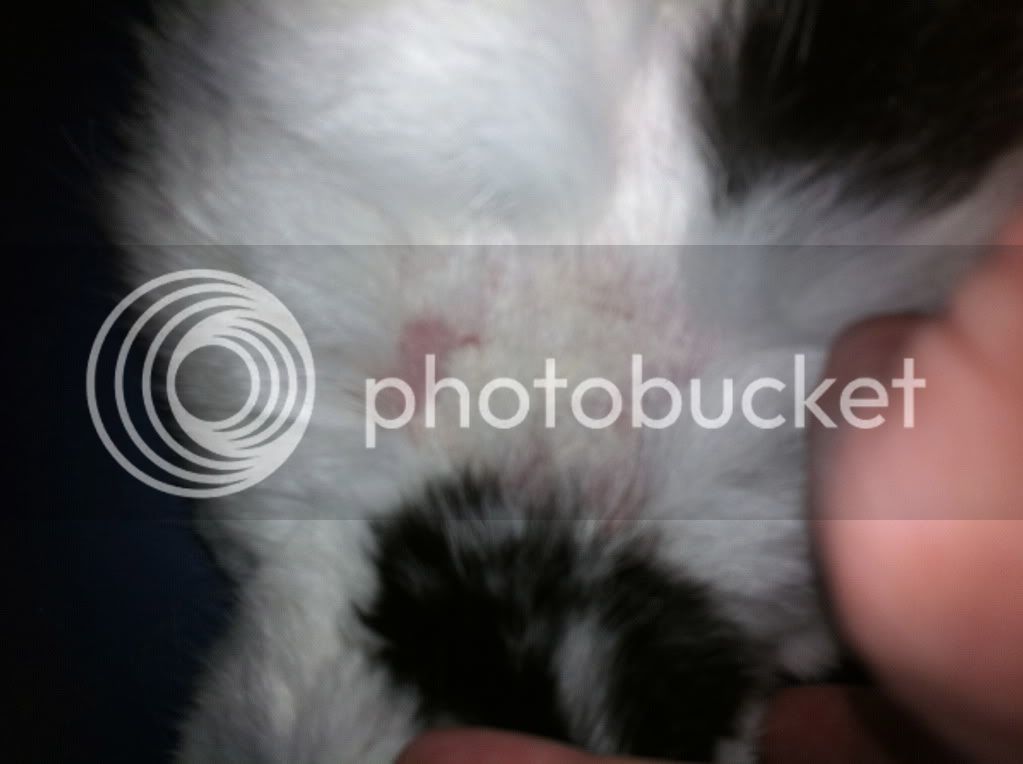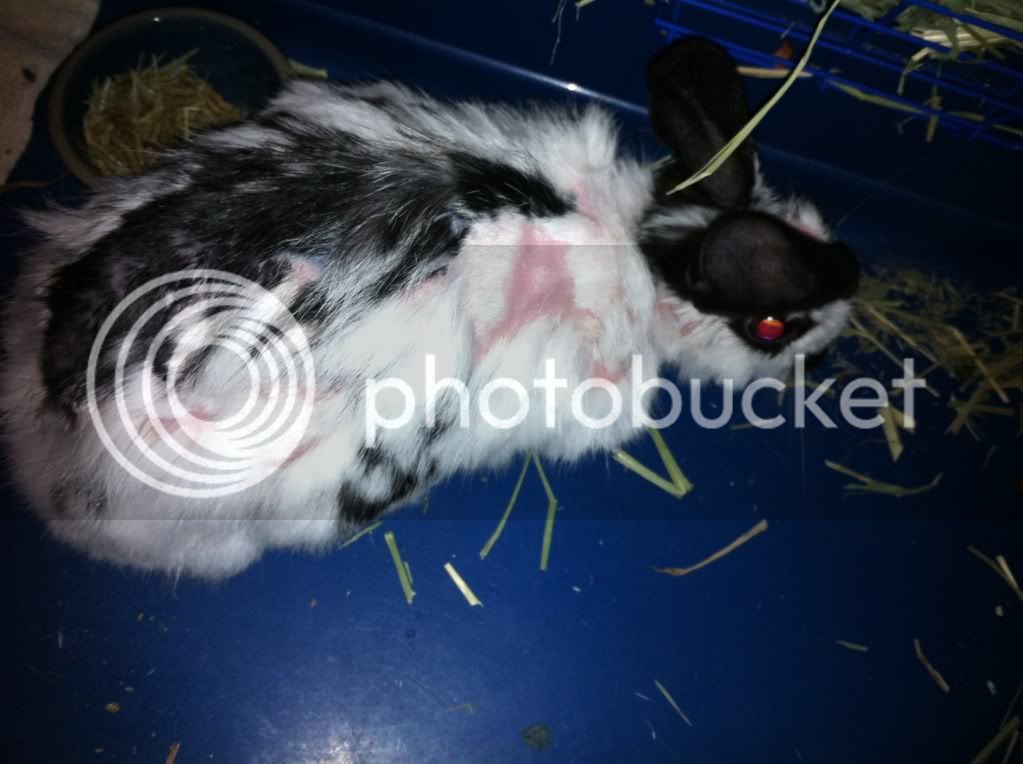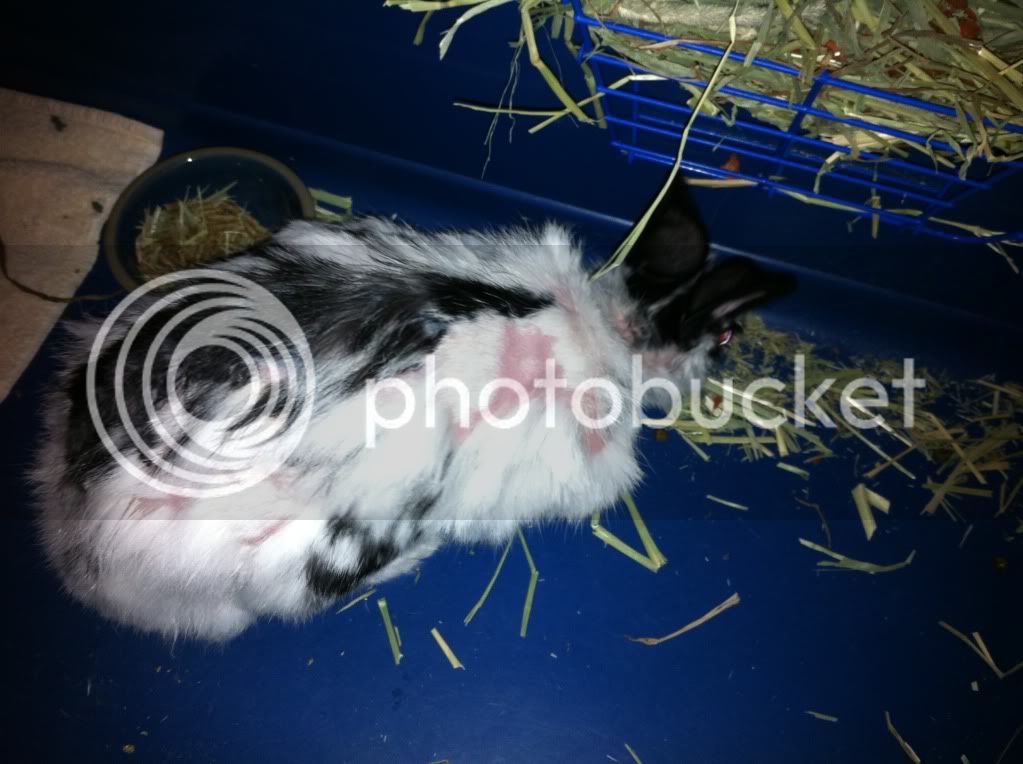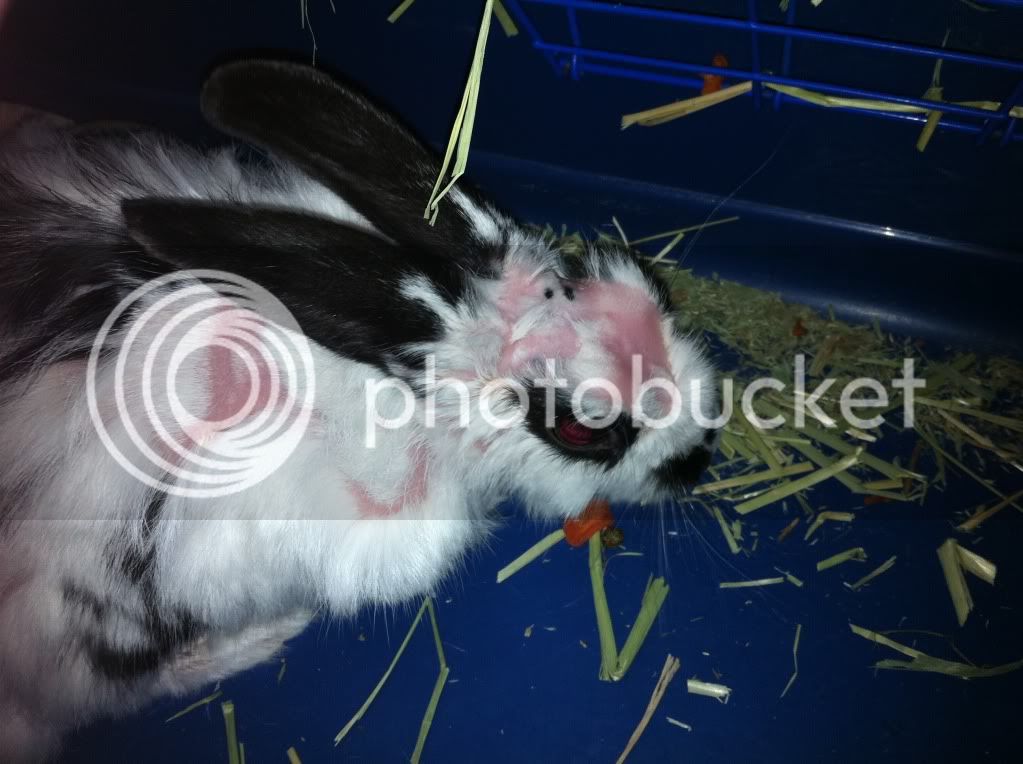DoryGeorgie
New Member
Hello. I'm writing in hopes that someone may have had a similar problem with their rabbit and hopefully found a successful treatment. As of now, my vet and I are stumped. â¨
Dory is my almost 6 year old (dob: 11/18/05). She is either a Rex or English Spot breed, but we think she's some kind of mix. On May 19th, when I was clipping her nails, I noticed that Dory had a ring of hair missing around her neck. I immediately made the 1st available appointment (which was weeks later on June 4th). By now, not only was a ring of hair around her neck missing, but also patches on her rump, shoulder, and belly. My vet thought that she had fur mites and we started her on a treatment of Ivermectin injections. By this point, she not only had a ring of missing hair around her neck, but a bare belly, and huge bald patches on her body and legs. 2 weeks later, I took her back to the vet to be checked. Honestly, I didn't see any change, but the vet said she was improving, so we would continue with at least 2 more injections (we were giving the injections 7 - 10 days apart).Â
So, after 4 weeks of treatment, she didn't seem to be improving and was also losing some weight. I decided to try a new vet that was Much closer to my home and specialized in small animals. Dory is mostly bald now, including most of the hair on her nose leading between the ears and behind her head. The new vet says it is definitely not fur mites, but suspected ringworm. So, a culture was taken and I was given Baytril (antibiotics), Cicapride (intestinal stimulant), and Oxbow Critical Care to help boost her immune system and get her to take in more nutrition because she wasn't eating her pellets. Also, we were instructed to bathe her with Ketoseb-D (a special shampoo) twice weekly and spray her with Vetericyn VF at least daily (this was of course conditional of how she handled it because we didn't want to over stress her.) By this point, Dory was only eating small amounts of hay and her veggies, was mostly bald, and very boney. Flash forward to July 23rd, and she didn't seem to be getting any better, no worse though. The ringworm culture was ready, but there was no growth and therefore not necessarily ringworm. My new vet still thinks that it may be fungal though. So, on top of the Baytril, Cicapride, critical care, baths, and Vetericyn VF spray; we have now added Griseofulvin (oral anti-fungal medication). Not to mention that in between the medicine doses, I've been sprinkling bene-bac on her veggies.Â
In the last week and a half, she is eating her pellets again (only small amounts), and has started growing hair back on top of her head and sparsely around her neck and belly. But she still has huge bald spots. At the root, the hair feels a little gummy and slightly yellowish in color (she's a black & white bunny). Some of her bald spots are soft (like baby's skin), but some of them are scaly and flakey.
Sorry for so much detail, but I'm hoping that it helps describe a problem in which someone may have come across.Â
Thanks in advance for any help you can provide.
~Ellie
June 18:

July 26:



Dory is my almost 6 year old (dob: 11/18/05). She is either a Rex or English Spot breed, but we think she's some kind of mix. On May 19th, when I was clipping her nails, I noticed that Dory had a ring of hair missing around her neck. I immediately made the 1st available appointment (which was weeks later on June 4th). By now, not only was a ring of hair around her neck missing, but also patches on her rump, shoulder, and belly. My vet thought that she had fur mites and we started her on a treatment of Ivermectin injections. By this point, she not only had a ring of missing hair around her neck, but a bare belly, and huge bald patches on her body and legs. 2 weeks later, I took her back to the vet to be checked. Honestly, I didn't see any change, but the vet said she was improving, so we would continue with at least 2 more injections (we were giving the injections 7 - 10 days apart).Â
So, after 4 weeks of treatment, she didn't seem to be improving and was also losing some weight. I decided to try a new vet that was Much closer to my home and specialized in small animals. Dory is mostly bald now, including most of the hair on her nose leading between the ears and behind her head. The new vet says it is definitely not fur mites, but suspected ringworm. So, a culture was taken and I was given Baytril (antibiotics), Cicapride (intestinal stimulant), and Oxbow Critical Care to help boost her immune system and get her to take in more nutrition because she wasn't eating her pellets. Also, we were instructed to bathe her with Ketoseb-D (a special shampoo) twice weekly and spray her with Vetericyn VF at least daily (this was of course conditional of how she handled it because we didn't want to over stress her.) By this point, Dory was only eating small amounts of hay and her veggies, was mostly bald, and very boney. Flash forward to July 23rd, and she didn't seem to be getting any better, no worse though. The ringworm culture was ready, but there was no growth and therefore not necessarily ringworm. My new vet still thinks that it may be fungal though. So, on top of the Baytril, Cicapride, critical care, baths, and Vetericyn VF spray; we have now added Griseofulvin (oral anti-fungal medication). Not to mention that in between the medicine doses, I've been sprinkling bene-bac on her veggies.Â
In the last week and a half, she is eating her pellets again (only small amounts), and has started growing hair back on top of her head and sparsely around her neck and belly. But she still has huge bald spots. At the root, the hair feels a little gummy and slightly yellowish in color (she's a black & white bunny). Some of her bald spots are soft (like baby's skin), but some of them are scaly and flakey.
Sorry for so much detail, but I'm hoping that it helps describe a problem in which someone may have come across.Â
Thanks in advance for any help you can provide.
~Ellie
June 18:

July 26:






